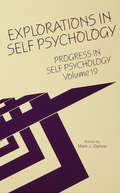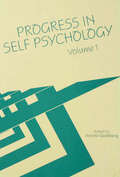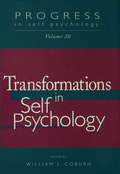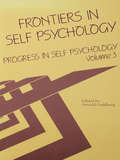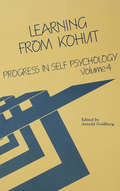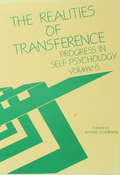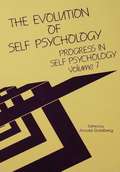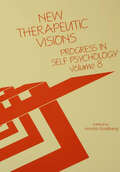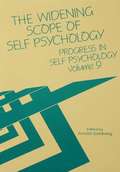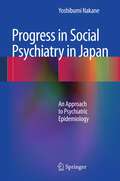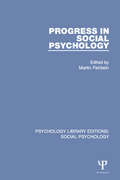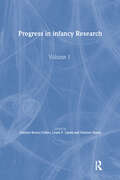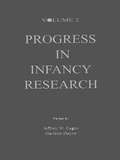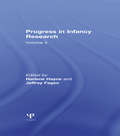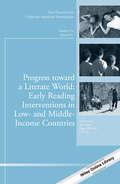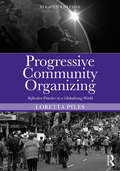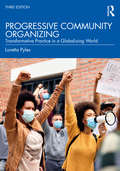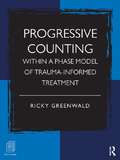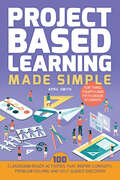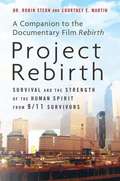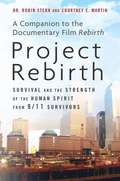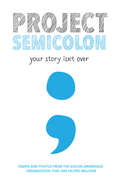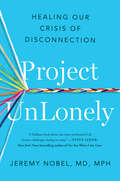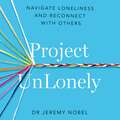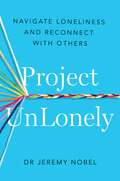- Table View
- List View
Progress in Self Psychology, V. 19: Explorations in Self Psychology
by Mark J. GehrieThe contributors to Explorations in Self Psychology, volume 19 of the Progress in Self Psychology series, wrestle with two interrelated questions at the nexus of contemporary discussions of technique: How "authentic" and relationally invested should the self psychologically informed analyst be, and what role should self-disclosure play in the treatment process? The responses to these questions embrace the full range of clinical possibilities. Dudley and Walker argue that empathically based interpretation precludes self-disclosure whereas Miller argues in favor of authentic self-expression and against the self psychologist's frustrating attempt to "decenter" from frustration or anger. Consideration of the utility of a consistently empathic stance continues with Weisel-Barth's clinical presentation and the discussions that it elicits about management of her patient's primary destructiveness. Lenoff's critical rereading of Kohut's "Examination of the Relationship Between Mode of Observation and Theory" and Rieveschl & Cowan's "Selfhood and the Dance of Empathy" deepen still further a contemporary perspective on the nature (and advisability) of a consistently empathic stance in the face of interactive and enactive treatment challenges. Other timely self-psychological explorations examine the twinship selfobject experience and homosexuality; self-psychological work with adolescents; and Neville Symington's theory of narcissism. Contributions to applied analysis explore topics as diverse as an exchange of dreams between John Adams and Benjamin Rush; Mann's Death in Venice; the films of Ingmar Bergman; psychotherapy of the elderly; and disabilities in the sensory-motor integration in children. And Volume 19 concludes with Constance Goldberg's candid and enlightening reminiscence of Heinz Kohut, "a very complex man with whom to be in a relationship."
Progress in Self Psychology, V. 1: The Evolution Of Self Psychology (Guilford Psychology Texts Ser.)
by Arnold GoldbergThe premier volume in the Progress in Self Psychology Series was completed two years after Heinz Kohut's death in 1981. Hence, this volume has a unique status in the history of self psychology: it bears the imprint of Kohut while charting a course of theoretical and clinical growth in the post-Kohut era. Biographical reminiscences about Kohut (Strozier, Miller) and commentaries on Kohut's "The Self-Psychological Approach to Defense and Resistance" [chapter seven of How Does Analysis Cure?] (M. Shane, P. Tolpin, Brandchaft, Oremland) are juxtaposed with a section of self-psychological reassessments of interpretations (Basch, A. and P. Ornstein, Goldberg). Clinical papers cover the selfobject transferences (Hall, Shapiro), patient compliance (Wolfe), and the "self-pity response" (Wilson), while theoretical contributions present ideas of Stolorow, Bacal, White, and Detrick that are foundational to their subsequent writings. This volume helped to shape the theoretical and clinical agenda of self psychology in the decades following Kohut's death.
Progress in Self Psychology, V. 20: Transformations in Self Psychology
by William J. CoburnTransformations in Self Psychology highlights the manner in which contemporary self psychology has become, in the words of series editor William Coburn, "a continuing series of revolutions within a revolution." Of special note are contributions that explore the bidirectional influences between self psychology and other explanatory paradigms. The volume begins with Stern's thoughtful attempt to integrate self-psychological and relational perspectives on transference-countertransference enactments. Fosshage and Munschauer's presentation of a case of "extreme nihilism and aversiveness" elicits a series of discussions that constructively highlights divergent perspectives on the meaning and role of enactment in treatment and on the so-called empathy/authenticity dichotomy. The productive exploration of theoretical differences also enters in the redefinition of notions of gender and sexuality, a topic of increasing interest to self psychologists. Differing perspectives, which give rise to differing clinical emphases, emerge in the exchanges of Clifford and Goldner, and of VanDerHeide and Hartmann. The special "contextualist" demands of work with intercultural couples foster a more integrative sensibility, with self-psychological borrowings from interpretive anthropology and attachment theory. Clinical contributors to Volume 20 explore manifestations of a tension that permeates all analytic work: that between the patient's newly emerging ability to expand the self in growth-consolidating ways and the countervailing dread to repeat. Enlarged by Malin's personal reflections of "Fifty Years of Psychoanalysis" and by book review essays focusing on the writings of Lachmann and Stolorow, respectively, Transformations in Self Psychology bespeaks the continuing vitality of contemporary self psychology.
Progress in Self Psychology, V. 3: Frontiers in Self Psychology
by Arnold GoldbergThe third volume in the distinguished Progress in Self Psychology series brings together the most exciting issues in a rapidly expanding field. Frontiers in Self Psychology is highlighted by sections dealing with self psychology and infancy and self psychology and the psychoses. Clinical contributions include several case studies along with a reconsideration of dream interpretation. Theoretical contributions span issues of gender identity, boundary formation, and the biological foundation of self psychology.
Progress in Self Psychology, V. 4: Learning from Kohut
by Arnold GoldbergThe fourth volume in the Progress in Self Psychology series continues to explore the theoretical yield and clinical implications of the wok of the late Heinz Kohut. Learning from Kohut features sections on "supervision with Kohut" and on the integration of self psychology with classical psychoanalysis. Developmental contributions examine self psychology in relation to constitutional factors in infancy. Clinical presentations focusing on optimum frustration and the therapeutic process and on the self-psychological treatment of a case of "intractable depression" elicit the animated commentary that makes this volume, like its predecessors, as enlivening as it is instructive.
Progress in Self Psychology, V. 6: The Realities of Transference
by Arnold GoldbergA collection of thoughtul presentations on transference and countertransference highlights The Realities of Transference, Volume 6 in the Progress in Self Psychology series. The selfobject transferences receive special attention. Elsewhere in this volme, selfobject phenomena are examined in relation to the process of working through, the origins of ambition, the psychology of addiction, the psychodynamic consequences of AIDS, and creativity. An exploration of the selfobjects of the second half of life offers new insight into later development.
Progress in Self Psychology, V. 7: The Evolution of Self Psychology
by Arnold GoldbergA special section of papers on the evolution, current status, and future development of self psychology highlights The Evolution of Self Psychology, volume 7 of the Progress in Self Psychology series. A critical review of recent books by Basch, Goldberg, and Stolorow et al. is part of this endeavor. Theoretical contributions to Volume 7 examine self psychology in relation to object relations theory and reconsider the relationship of psychotherapy to psychoanalysis. Clinical contributions deal with an intersubjective perspective on countertransference, the trauma of incest, and envy in the transference.
Progress in Self Psychology, V. 8: New Therapeutic Visions
by Arnold GoldbergNew Therapeutic Visions begins with Lachmann and Beebe's developmental perspectives on representational and selfobject transferences, followed by commentaries. In Section II, the self-psychological approach is brought to bear on the clinical treatment of an adolescent girl, incest survivors, addictive personalities, patients exhibiting codependency, and a case of desomatization. Section III, on applied self psychology, contains chapters on the theory of creativity; subjectivism, relativism, and realism in psychoanalysis; and quantum physics and self psychology. The final section offers two critical review essays on major contributions to the self psychology literature by Wolf, by Bacal and Newman, and by Lichtenberg. Stolorow's chronicle of his personal odyssey into self psychology and intersubjectivity theory rounds out volume 8 of the Progress in Self Psychology series.
Progress in Self Psychology, V. 9: The Widening Scope of Self Psychology
by Arnold GoldbergThe Widening Scope of Self Psychology is a watershed in the self-psychological literature, being a contemporary reprise on several major clinical themes through which self psychology, from its inception, has articulated its challenge to traditional psychoanalytic thinking. The volume opens with original papers on interpretation by eminent theorists in the self-psychological tradition, followed by a series of case studies and clinically grounded commentaries bearing on issues of sex and gender as they enter into analysis. Two thoughtful reexaminations of the meaning and treatment challenges of chronic rage are followed by clinical papers that focus, respectively, on mourning, alter ego transferences, resistance to change, and pathological identification. Applied analytic contributions and a review of Goldberg's The Prisonhouse of Psychoanalysis round out a collection that testifies not only to the widening scope of self psychology, but to its deepening insights as well.
Progress in Social Psychiatry in Japan
by Yoshibumi NakaneSocial psychiatry is a multidisciplinary field analyzing mechanisms of mental health issues comprehensively to contribute to society using the findings. Those findings include biological, psychological, and social aspects and they are based on psychiatry and connected with a wide variety of academic fields, including psychology, sociology, law, economics, and religious studies. Epidemiological research in psychiatry is a field of study in patients with psychiatric disorder attempting to investigate causes, to develop clinical applications of the results, and to determine applications to health services plans for individuals and/or communities. They are both foundation for understanding biopsychosocial view in psychiatry but not many comprehensive volumes covering the topic were not available until now. This book is thus a unique, comprehensive reference with evidence-based approach to provide concise summary of researches for such as schizophrenia, affective disorders, psychiatric disorders in the general practice setting, and disaster psychiatry, especially for the case of atomic bomb diseases. The studies were mostly carried out in the region of Nagasaki, the prefecture experienced a nuclear attack at the time of World War . Psychiatric findings in mental health problems among atomic bomb survivors and sufferers in Nagasaki has been established and Nagasaki is the only area that fulfills the conditions of the subject of the study of psychiatric epidemiology and social psychiatry which is going to be described in this book. This book provides a valuable resource not only for physicians and researchers in the field of psychiatry and mental health but for people who work for mental health welfare department.
Progress in Social Psychology: Volume 1 (Psychology Library Editions: Social Psychology)
by Martin FishbeinOriginally published in 1980, this title was the first of a new monograph series in social psychology. The editor presents a format for showing the progress of social psychology as a viable, exciting and relevant discipline. <P><P>The papers contained in this volume represent progress in theory and method as well as in basic and applied research. In addition, recognising that not all social psychology is produced by people who label themselves as ‘social psychologists’ the volume contains the contributions of scholars who are best known for their work in other areas.
Progress in infancy Research: Volume 1
by Lewis P. Lipsitt Harlene Hayne Carolyn Rovee-CollierThe Progress in Infancy Research Series is dedicated to the presentation of innovative and exciting research on infants, both human and animal. Each volume in the series is designed to stand alone and contains autonomous chapters which are based on high quality programs of research with infants. These chapters integrate the work of the authors with that of other experts working in the same or related areas. The authors wish to present high quality critical syntheses bearing on infant perception and sensation, learning and memory processes, and other aspects of development. This series will be a forum for the presentation of technological breakthroughs, methodological advances, and new integrations that might create platforms for future programmatic work on the complexities of infant behavior and development. Each volume in the series is dedicated to an outstanding investigator whose research has illuminated the nature of infant behavior and development, and whose contributions to the field have been of seminal importance.
Progress in infancy Research: Volume 2 (Progress in Infancy Research Series)
by Harlene Hayne Jeffrey W. FagenThe Progress in Infancy Research Series is dedicated to the presentation of innovative and exciting research on infants, both human and animal. Each volume in the series is designed to stand alone and contains autonomous chapters which are based on high quality programs of research with infants. These chapters integrate the work of the authors with that of other experts working in the same or related areas. The authors wish to present high quality critical syntheses bearing on infant perception and sensation, learning and memory processes, and other aspects of development. This series will be a forum for the presentation of technological breakthroughs, methodological advances, and new integrations that might create platforms for future programmatic work on the complexities of infant behavior and development. Each volume in the series is dedicated to an outstanding investigator whose research has illuminated the nature of infant behavior and development, and whose contributions to the field have been of seminal importance.
Progress in infancy Research: Volume 3 (Progress In Infancy Research Ser.)
by Harlene Hayne Jeffrey FagenThe Progress in Infancy Research Series is dedicated to the presentation of innovative and exciting research on infants, both human and animal. Each volume in the series is designed to stand alone and contains autonomous chapters which are based on high quality programs of research with infants. These chapters integrate the work of the authors with that of other experts working in the same or related areas. The authors wish to present high quality critical syntheses bearing on infant perception and sensation, learning and memory processes, and other aspects of development. This series will be a forum for the presentation of technological breakthroughs, methodological advances, and new integrations that might create platforms for future programmatic work on the complexities of infant behavior and development. Each volume in the series is dedicated to an outstanding investigator whose research has illuminated the nature of infant behavior and development, and whose contributions to the field have been of seminal importance.
Progress toward a Literate World: Early Reading Interventions in Low- and Middle-Income Countries: New Directions for Child and Adolescent Development, Number 155 (J-B CAD Single Issue Child & Adolescent Development)
by Peggy McCardle Amber Gove April MoraIn order to work toward eradicating extreme poverty and hunger, the United Nations Millennium Development Goals significantly include universal primary education, gender equality, and empowering women. Effective early literacy instruction plays a critical role in achieving these goals. From around the globe, this issue presents evidence-based, culturally sensitive and cost-effective practices in reading instruction and intervention in the early grades. Not only will this issue heighten awareness of the challenges faced but it will provide valuable information to help guide and improve diverse global education programs and research, especially in developing regions and for children living in poverty or disadvantage in all nations.Presenting several experiences from small- and large-scale reading improvement programs, it: Focuses on low- and middle-income countries, Describes challenges in implementing, studying, and scaling them up, Informs expectations on how quickly and easily reading performance can change, and Provides results and evidence of effectiveness. This is the 155th volume in this Jossey-Bass series New Directions for Child and Adolescent Development. Its mission is to provide scientific and scholarly presentations on cutting edge issues and concepts in this subject area. Each volume focuses on a specific new direction or research topic and is edited by experts from that field.
Progressive Community Organizing
by Loretta PylesThe second edition of Progressive Community Organizing offers a concise intellectual history of community organizing and social movements while also providing practical tools geared toward practitioner skill building. Drawing from social-constructionist, feminist and critical traditions, Progressive Community Organizing affirms the practice of issue framing and offers two innovative frameworks that will change the way students of organizing think about their work. Progressive Community Organizing is ideal for both undergraduate and graduate courses focused on community theory and practice, community organizing, community development, and social change and service learning. The second edition presents new case studies, including those of a welfare rights organization and a youth-led LGBTQ organization. There are also new sections on the capabilities approach, queer theory, the Civil Rights movement, and the practices of self-inquiry and non-violent communication. Discussion of global justice has been expanded significantly and includes an account of a transnational action-research project in post-earthquake Haiti. Each chapter contains discussion questions, written and web resources, and a list of key terms; a full, free-access companion website is also available for the book.
Progressive Community Organizing: Transformative Practice in a Globalizing World
by Loretta PylesNow in its third edition, Progressive Community Organizing: Transformative Practice in a Globalizing World introduces readers to the rich practice of progressive community organizing for social change while also providing concrete tools geared toward practitioner skill building. Drawing from social movement scholarship and social theory, this book articulates a transformative approach to organizing that embraces emergent strategies and healing justice. It emphasizes framing processes and the power of stories using story-based strategy and digital activism. Embracing intersectional organizing, the book addresses topics such as identity politics, microagressions, internalized oppression, and horizontal hostility with attention to recentering and allyship as a growth-oriented journey of solidarity and liberation. Readers will engage with case studies focused on issues such as poverty, racial justice, immigration, housing, health and mental health, and climate crisis. This new edition includes: Expanded content on transformative change approaches including healing justice New content on the role of digital technology and social media in organizing Case studies of the Poor People’s Campaign and Extinction Rebellion Emphasis on the power of stories and story-based strategy for organizing and issue framing Transformative organizations with attention to feminist and decolonized organizational structures and cultures Expanded chapters on strategies and tactics focusing on power analysis and a range of tactics from direct action to resilience-based organizing The book will be of interest to students and practitioners who want to become more skilled in structural analysis, praxis, and self-reflexivity through critical and transformative engagement with historical and current social problems, social movements, and social welfare.
Progressive Counting Within a Phase Model of Trauma-Informed Treatment
by Ricky GreenwaldClinicians recognize trauma & loss as a prominent source of clients' problems. Progressive counting represents a significant advance in trauma treatment, because it is about as efficient, effective, and well-tolerated as EMDR while being far simpler for therapists to master and do well. PC's value has already been supported by two open trials and a controlled study. Are you ready to provide therapy that routinely affects profound healing and lasting change? This book will show you how.
Project Based Learning Made Simple: 100 Classroom-Ready Activities that Inspire Curiosity, Problem Solving and Self-Guided Discovery (Books for Teachers)
by April Smith100 ready-to-use projects to challenge and inspire your third-, fourth- and fifth-graders!Project Based Learning Made Simple is the fun and engaging way to teach twenty-first-century competencies including problem solving, critical thinking, collaboration, communication and creativity. This straightforward book makes it easier than ever to bring this innovative technique into your classroom with 100 ready-to-use projects in a range of topics, including: Science and STEM • Save the Bees! • Class Aquarium • Mars Colony Math Literacy • Personal Budgeting • Bake Sale • Family Cookbook Language Arts • Candy Bar Marketing • Modernize a Fairy Tale • Movie Adaptation Social Studies • Build a Statue • Establish a Colony • Documenting Immigration
Project Rebirth
by Martin Stern Dr Robin Courtney E.Written in conjunction with the documentary Rebirth, a full decade in the making, an uplifting look at the lives of eight individuals whose lives were forever changed by the events of September 11, 2001.
Project Rebirth: Survival and the Strength of the Human Spirit from 9/11 Survivors
by Courtney E. Martin Robin SternEach year, every year, on the anniversary of the attacks, Jim Whitaker and his film crew interviewed eight people who were directly affected by the events of 9/11. They used five of these subjects and their words as the basis for the documentary Rebirth, which premiered at the Sundance Film Festival in 2011. Based on the film, the book Project Rebirth allows the powerful rediscovery stories of all these individuals - both those featured in the film and those whose stories did not make it onto celluloid - to be shared with the world. Book jacket.
Project Semicolon: Your Story Isn't Over
by Amy BleuelFor fans of PostSecret, Humans of New York, and If You Feel Too Much, this collection from suicide-awareness organization Project Semicolon features stories and photos from those struggling with mental illness. Project Semicolon began in 2013 to spread a message of hope: No one struggling with a mental illness is alone; you, too, can survive and live a life filled with joy and love. In support of the project and its message, thousands of people all over the world have gotten semicolon tattoos and shared photos of them, often alongside stories of hardship, growth, and rebirth.Project Semicolon: Your Story Isn't Over reveals dozens of new portraits and stories from people of all ages talking about what they have endured and what they want for their futures. This represents a new step in the movement and a new awareness around those who struggle with mental illness and those who support them. At once heartfelt, unflinchingly honest, and eternally hopeful, this collection tells a story of choice: every day you choose to live and let your story continue on.Learn more about the project at www.projectsemicolon.com.
Project UnLonely: Healing Our Crisis of Disconnection
by Jeremy NobelInsight into our new world of loneliness that offers solace, hope, and solutions.Even before 2020, chronic loneliness was a private experience of profound anguish that had become a public health crisis. Since then it has reached new heights. Loneliness assumes many forms, from enduring physical isolation to feeling rejected because of difference, and it can have devastating consequences for our physical and mental health. As the founder of Project UnLonely, Jeremy Nobel unpacks our personal and national experiences of loneliness to discover its roots and to show how we can take steps to find comfort and connection. Dr. Nobel brings together many voices, from pioneering researchers, to leaders in business, education, the arts, and healthcare, to lonely people of every age, background, and circumstance. He discovers that the pandemic isolated us in ways that were not only physical, and that, at its core, a true sense of loneliness results from a disconnection to the self. He clarifies how meaningful reconnection can be nourished and sustained. And he reveals that an important component of the healing process is engaging in creativity, a powerful opportunity he shows us can be accessed by all. Supportive and clear-eyed, this is the book we will take into our new normal and rely on for years to come.
Project UnLonely: Navigate Loneliness and Reconnect with Others
by Jeremy NobelDr Jeremy Nobel offers practical solutions to the growing crisis of loneliness.Chronic loneliness is a private experience of profound anguish. It has also become a public health crisis. The Unlonely Project will not just sound an alarm about the significant, growing negative impact of loneliness on nearly every sector of society, but also offer solace, hope and solutions.While we can't cure loneliness the way we can cure strep throat or even cancer, there are concrete, actionable and effective things we can do to manage it and keep it from becoming chronic. For an individual lonely listener, or for anyone who loves, serves, treats, or employs people vulnerable to loneliness in community, work or educational settings, this audiobook will clarify how meaningful reconnection between the self and others begins, and how it can be nourished and sustained.(P)2023 Penguin Audio
Project UnLonely: Navigate Loneliness and Reconnect with Others
by Jeremy NobelEven before 2020, chronic loneliness was a private experience of profound anguish that had become a public health crisis. Since then it has reached new heights. While we can't cure loneliness the way we can cure strep throat or even cancer, there are concrete, actionable and effective things we can do to manage it and keep it from becoming chronic. For an individual lonely reader, or for anyone who loves, serves, treats, or employs people vulnerable to loneliness in community, work or educational settings, this book will clarify how meaningful reconnection between the self and others begins, and how it can be nourished and sustained.Loneliness assumes many forms, from enduring physical isolation to feeling rejected because of difference, and it can have devastating consequences for our physical and mental health. As the founder of Project UnLonely, Dr. Jeremy Nobel unpacks our personal and national experiences of loneliness to discover its roots and to show how we can take steps to find comfort and connection. Dr. Nobel brings together many voices, from pioneering researchers, to leaders in business, education, the arts, and healthcare, to lonely people of every age, background, and circumstance. He discovers that the pandemic isolated us in ways that were not only physical, and that, at its core, a true sense of loneliness results from a disconnection to the self. He clarifies how meaningful reconnection can be nourished and sustained. And he reveals that an important component of the healing process is engaging in creativity, a powerful opportunity he shows us can be accessed by all. Project UnLonely will not just sound an alarm about the significant, growing negative impact of loneliness on nearly every sector of society, but also offer solace, hope and solutions. Supportive and clear-eyed, this is the book we will take into our new normal and rely on for years to come.
